
|
Breathless (1960, Fr.) (aka
A Bout de Souffle)
In French writer/director Jean-Luc Godard's pioneering,
landmark New Wave film, his first feature film - this innovative,
influential, and fresh film - a noirish, crime-gangster romance -
liberally used the jump cut (in jagged, jolting and non-logical ways),
a hand-held camera, natural lighting, non-linear storytelling, on-location
shootings, and loose, improvised direction and editing. There was
no solid script to be rehearsed, and the sound was unsynchronized
(and only added in post production). The entire free-spirited film
seemed disorganized, reckless, and roughly-hewn - as a deliberate
strategy to harshly communicate movement, urgency, and excitement.
The main character in the cool and 'hip' low-budget
film was a nihilistic, Parisian wanna-be, petty thug and self-destructive
daredevil (with a fetish and admiration for American actor Humphrey
Bogart and film noir) who was played by 26 year-old Jean-Paul Belmondo.
The entire film played up, copied, and was a parody of American gangster
films. The disaffected young male joined up with his aloof and detached
20 year-old US girlfriend-lover (portrayed by 22 year-old Jean Seberg)
- an ultimate femme
fatale character in a doomed romance. Both exhibited self-indulgence
and narcissism and appeared in lengthy and incoherent scenes (expressing
considerable boredom, dissatisfaction, and dazed confusion) before
they were led to a tragic, inevitable ending.
The original story for the film was written
by Godard's friend and colleague Francois Truffaut, another New Wave
writer and director, while its traditional screenplay was
written by Godard himself (although uncredited). Breathless owed
some of its "lovers
on the lam" plot
to predecessors including Nicholas Ray's They Live by Night
(1948) and Joseph H. Lewis's Gun
Crazy (1950). It went on to influence auteurs such as Arthur
Penn (Bonnie and Clyde (1966)), Terence
Malick (Badlands (1973)), Steven Spielberg
(The Sugarland Express (1974)),
and Robert Altman (Thieves Like Us (1974)).
There were no credits in the film except for the opening title and
the word "FIN" at the end. The film
was remade as director Jim McBride's R-rated Breathless (1983), starring
Richard Gere and Valerie Kaprisky as the two lovers in Los Angeles
(although the roles were reversed - the male was American and the
female was French).
- the film opened with Godard's dedication to the
US studio Monogram Pictures, known for low-budget, grade-B crime
dramas
- the film's first image was the comic page of a newspaper
(Paris-Flirt), with a sketched drawing of a sexy, lingerie-wearing
pin-up model (seen from behind); the newspaper was lowered to reveal
the main male character; the first line of dialogue was comprised
of the musings of the male speaker (voice-over and off-screen): "After
all, I'm stupid (or an asshole)" - coming from the lips of
a young, arrogant and vulgar thug - a wanted car thief
named Michel Poiccard/alias Laszlo Kovacs (Jean-Paul Belmondo);
the anti-hero character was reading a newspaper in Marseilles,
wearing a tilted fedora-hat and smoking a cigarette; he traced
his thumb over both closed lips (a trademark gesture)

|

|

|
|
Film's Opening: Petty Thug Michel Poiccard (Jean-Paul
Belmondo)
|
- Michel's girlfriend in Marseilles signaled to him
that a potential car to steal had parked nearby; Michel hotwired
the US-made Oldsmobile automobile owned by a US Army Officer,
and drove the stolen car off toward Paris - he refused to take
his girlfriend with him; his plan was to drive to Paris, collect
on some debts, pick up another girlfriend named Patricia, and
flee to Rome with her
- as he drove through the countryside, he addressed
the camera-audience; at one point, he declined to pick up two "ugly"
female hitchhikers; after finding a gun in the glove compartment,
he pretended to shoot at the sun and passing cars; he murdered
a motorcycle policeman who stopped him for speeding - emphasized
with a magnification of his gun before he pulled the trigger; once
he arrived in Paris by hitchhiking, he looked in a newspaper to
see if he had been identified as a killer, and then wiped his shoes
with the paper
- Michel met up with one of his ex-girlfriends (an assistant film scriptwriter)
in her apartment, who suggested: "You need to sleep around," and
also asked: "Ever been a gigolo?"; when she was distracted, he
recklessly stole money from her purse and from money (500 francs)
she offered to loan to him; she called him a "creep"
- and then on the street, he located his
flighty, short-haired 20 year-old American girlfriend Patricia Franchini
(Jean Seberg) from New York who was selling newspapers (the New York Herald Tribune - displayed
on her T-shirt) on the Champs-Elysees boulevard; he had known the
radiantly-beautiful, tomboyish, aspiring journalist student for only
five nights during a short trysting affair in Nice (before she left him)
- Michel tried to repeatedly convince her
to join him in Rome: "Come with me to Rome?"; the camera
followed behind them and overheard their conversation (Michel: "It's
crazy. I wanted to see if I'd be glad to see you again"), and
then they reversed themselves; he bought one of her newspapers and
looked for his horoscope, but couldn't find one; he asked Patricia: "I
want to know the future. Don't you?"; he told her that he first
had to collect money owed to him and then would see her: "I
have to see a man who owes me money. Then I have to see you";
she refused his continued attempts to get her to leave Paris, because
she was planning to attend the Sorbonne from money supplied by her
rich parents: "I
have to enroll at the Sorbonne so my parents will send money";
they considered meeting up later that evening
- after leaving Patricia, Michel walked past a poster
for writer/director Robert Aldrich's action drama Ten Seconds
to Hell (1959) (starring Jack Palance) with the tagline: "LIVE DANGEROUSLY UNTIL THE END!";
a young girl approached on a street corner to sell Michel a copy
of the French film magazine Cahiers du Cinéma No. 97 (the July 1959 edition
with a picture from the film Hiroshima Mon Amour (1959) on
its cover, another New Wave film; one of the magazine's regular
writers was Godard - this film's pioneering director), but he ignored
her, and she asked: "Sir, have you anything against youth?"; he
answered: "Sure do. I prefer old people"
- Michel witnessed a car accident
that left a male pedestrian (Jacques Rivette) dead on the street;
Michel crossed himself, and then noticed in the newspaper that
he had been identified as a police murderer: ("POLICEMAN'S
KILLER IDENTIFIED"); inside the Inter-Americana Agency, he met with Mr. Tolmachov (Richard
Balducci) to collect on a debt; Michel also attempted to contact
by phone another colleague Antonio Berruti (Henri-Jacques Huet)
to pay up on another debt, but couldn't reach him
- after leaving the agency, two police inspectors arrived to ask about
murder suspect Michel - who was identified as an ex-Air France steward
who regularly collected his mail there; although Tolmachov lied
to the inspectors about recently seeing Michel, his secretary told
the men that Michel had just come into the agency five minutes earlier
- while wandering around Paris and
exting onto the sidewalk from a subway entrance, Michel paused
outside of a movie theatre and gazed at a poster for a film-noirish
sports (boxing) picture The Harder They Fall
(1956) - noted as star Humphrey Bogart's final film role; Michel also looked dreamily
in a glass display case at a picture of the film's star Humphrey
Bogart, Michel's idol; he reverently and simply whispered "Bogey" as
he mimed his hero, blew out wispy smoke from his cigarette, and
again traced his thumb over both closed lips
|
Homage to 'Bogey'
|

The Harder They Fall (1956) - Humphrey Bogart Poster
|

Wisps of Cigarette Smoke
|
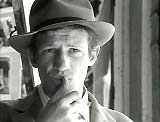
Thumb Moved Over Closed Lips
|
- after meeting up with Patricia - but broke without
money and unable to go out to dinner with her, Michel entered
a restaurant's restroom where he mugged a man and stole his money;
when he returned to Patricia, he immediately asked: "Sleep with
me tonight?"; to test and hint at Patricia,
Michel told her about a newspaper article he had read about how
a bus conductor confessed to his girlfriend that he was a "bad
guy" who had stolen 5 million francs to impress and seduce her
with a 3-day trip to the Riviera - and the girl then decided to
become his criminal sidekick
- Patricia announced that she had forgotten that she
had a press conference appointment with a journalist on the Champs-Elysees;
after demanding to see her later that evening and getting rejected,
Michel offered to give her a lift in his stolen convertible; during
their aimless discussion in the car, the camera was positioned behind
Patricia for nearly the entire sequence; multiple break-through
jump cuts were inserted in the sequence; he kept pressuring to
see her and make love and that he really needed her; when she asked: "Why
are you so sad?", in a dramatic tone, he told her: "I
can't do without you... Alas, alas, alas! I love a girl who has a
nice neck, nice breasts, a nice voice, nice wrists,
a nice forehead, nice knees. But she's such a coward!";
when she was dropped off, she kissed him on the cheek; as she walked
away, he yelled at her: "Get lost, then! I never want to see
you again. Get lost! Get lost, you creep!"
- after riding up the restaurant's escalator, Patricia
met for dinner on an outside restaurant balcony in Montparnasse
with a journalist; it was revealed that he was writing a book -
and he presented it to her: ("This is the book I promised you");
he told her it was about a woman who died from an abortion after
an unwanted pregnancy: "I
hope that nothing happens to you like the woman in the book";
Patricia told him about her own personal unhappiness and search
for meaning in life: "If
I could dig a hole and hide in it, I would";
he responded: "You should be like an elephant. When they're
sad, they vanish"; she
told him (in English): "I don't know if I'm unhappy because I'm
not free, or if I'm not free because I'm unhappy"; he responded
by telling her about a friend's wishes - implying that he would like
to ask her to sleep with him - and wondering if she felt the same way

Patricia's Dinner Meeting With Journalist
|

Patricia: ""If I could dig a hole and
hide in it, I would"
|

Patricia Kissing the Journalist in His Car (as
Michel Watched From Afar)
|
- they made plans to meet again the next afternoon
at Orly Airport for an interview with novelist Parvulesco (film
director Jean-Pierre Melville); Michel watched them from inside
the restaurant as they left arm-in-arm, and he saw Patricia kiss
the journalist in his convertible sports car before they drove
off
- the next day, Patricia exited a city bus, played
hopscotch with road markers, and admired her reflection in a storefront
mirror; afterwards, as she entered her apartment building, she
was surprised to find Michel there in her bed (he had entered after
using her downstairs key); the next 23-minute
scene was bursting with erotic energy between Patricia and Michel
(a hallmark of spontaneous, meandering and improvisational acting/film-making
as they chatted, flirted, smoked, and fought), often with wailing
sirens heard through the open window and drowning out the character's
dialogue

|

|

|
|
Making Three 'Faces' at Her
|
- she immediately complained: "You're crazy...
I can never be alone when I want to be"; he made three goofy
'faces' at her - she duplicated his looks in front of her bathroom
mirror; he returned the insult: "You're even crazier than
me"; while looking at himself in a mirror, Michel told her: "I
always fall for girls who aren't for me"; she told him to
leave her alone, because she was thinking, but then told him: "I'm
not thinking about anything. I'd like to think about something,
but I can't seem to"; Michel expressed how he was jealous
that she spent time with the journalist, but she defended herself: "I
had to. He's getting me articles to write. It's really important
to me"; when she was asked if she had sex with the journalist, she told Michel:
"He said one day we'd sleep together, but not now"
- Michel kept insisting on making love to her: "I
want to sleep with you again...It means I love you"; Patricia
explained how she wasn't so sure of her love for him, as she hugged
a teddy bear; Michel flipped through a magazine with black and white
photographs of naked women: [Note: The cover revealed its title:
"Photographing The Female Figure" by Bunny Yeager, a 1957 publication,
although the pictures shown were from another publication]
- Michel expressed dissatisfaction
that she wouldn't commit to him like so many other females: "A
woman never wants to do in eight seconds what she'll want to do eight
days later. Eight seconds or eight days, it's all the same. Why not
eight centures?...A woman's all half-measures. It gets me down";
she explained how she wanted to first find out what she liked about
him before sleeping with him again; she told how she was more
romantically inclined: "I want us to be like Romeo and Juliet...
You said last night you couldn't live without me, but you can.
Romeo couldn't live without Juliet, but you can";
a picture of the two lovers hung on Patricia's wall
- Michel suggested a brutish, dangerous
macabre game (of passion and violence) that he described: "Give
me a smile...I'll count to 8. If by 8 you haven't smiled, I'll strangle
you" - and she eventually smiled at 7 and 3/4ths; she slapped him when he
pulled up the back of her skirt for a peek (later she told him he
wasn't just looking at her legs); while smoking together, he asked
if she ever thought about death; she challenged him to "say
something nice," and asked him to consider where she should hang her Renoir poster in
the bedroom; he kept demanding: "I want to sleep with you again because
you're beautiful"; she proposed: "I'll stare at you until you stop
staring at me" - he rubbed his thumb on his lips as he stared back;
after viewing him through the rolled-up poster and creating a telescopic
iris effect, they began to passionately kiss; he sensually touched
her bottom in the bathroom where she was attempting to hang up her poster

Counting to 8 Game
|

Staring at Each Other
|

|

|
|
Viewing Him Through a Rolled Up Poster - Iris Effect
|
- in the bathroom next to the Renoir poster, she asked:
"Think she's prettier than me?" - he replied: "When you're scared
or surprised, or both at once, there's a funny glint in your eyes....I
want to sleep with you again because of that glint"
- as she washed her feet and Michel pissed in the sink,
she also divulged a possibility that she was bearing his child: "I'm
pregnant, Michel" - when he asked if it was his, she replied: "I think so";
he blamed her: "You should've been more careful!" and scolded
her: "Some idea, having a kid!"; he alternated between
insulting her looks and personality and praising
her for her charming, pretty self; in between, he again attempted
to phone Berruti to collect on a debt but was unsuccessful; he also
learned from Tolmachov that the police were after him
- he continued to insult and praise Patricia: "Take
your clothes off...You Americans are so stupid"; he complained
about not finding those who owed hm money: "I can't find the man
who owes me money. What a pain!"; he rudely told her: "Quiet, I'm
thinking" and shortly later asked: "In New York, did you sleep
with a lot of men?"; she answered with seven fingers held up ("Not
too many"), while he responded he had slept with 22 women ("Not
so many either"); he then insulted the attractiveness of Swedish
girls; from his experience, Michel thought that girls who were
pretty and charming and rated 15 out of 20 could not be found
in Rome, Rio or Paris but in Lausanne and Geneva
- Patricia attempted to assert her independence:
"I'm scared, because I want you to love me, but at the same time,
I want you to stop loving me. I'm very independent, you know";
he answered her: "I love you, but not the way you think"; she felt
that he was hard to read and enigmatic: "I want to know what's behind
your face. I've looked at it for 10 minutes, and I still know nothing,
nothing. I'm not sad, I'm scared"; he called her "sweet and gentle,"
but then insulted her again as: "cruel, stupid, heartless, pathetic,
cowardly, despicable"
- to distract him from wanting to take her top off,
Patricia wished to discuss her favorite book written by novelist
William Faulkner, Wild Palms - and read an excerpt (in English and French): "Between grief
and nothing, I will take grief"; when asked which he preferred,
Michel answered: "Grief's stupid. I'd choose nothing. It's not
better, but grief's a compromise. I want all or nothing"; the two
also playfully hid under the sheet as Patricia described them: "We're
hiding like happy elephants"; shortly later after love-making (off-screen), he asked: "Was it
good?"; after dressing to go out, she asked about which part he
liked the most: her eyes, mouth, or shoulders, but Michel didn't respond
- while sitting in an outdoor cafe, Michel ran off
to steal another car (a US-made Ford Thunderbird convertible)
and drove Patricia to her NY Herald Tribune office and dropped
her off for a brief visit; then, he bought a newspaper from a sidewalk
vendor, realizing that the headlines were proclaiming: "Police
Killer Still at Large"; a suspicious, pipe-smoking bystander,
identified as the Snitch (or Informer) in the credits (director Jean
Luc-Godard) recognized Michel and reported him driving off with Patricia
on the way to her interview at the Orly Airport - with a closing
iris

|

|
|
Michel Identified and Pointed Out by
a Bystander - the Snitch (Director Jean Luc-Godard)
|
- at the event on the open-air deck of the Orly Airport,
trendy Italian novelist Parvulesco, author of Candida, was
being questioned by a group of admiring journalists, with questions
about differences in romantic attitudes between American and French
women, questions of gender, the issue of eroticism vs. romantic
love, the existence of the soul, and womens' role in modern society; the
writer stated that men only wanted women, while women only wanted
money; to Patricia's question about his greatest ambition (asked
twice), the writer answered: "To become immortal and then die"
- meanwhile, Michel (using the alias name Laszlo Kovacs)
attempted to sell the stolen Ford convertible at a car lot, but
was told by the uncooperative and suspicious dealer that he wouldn't
pay out 800,000 francs until the following week, due to
his picture in the newspaper as a wanted man ("You don't get the
money now"); the distributor cap was removed from the car to make
it inoperative, forcing Michel to hire a taxi to pick up Patricia
at the airport; as they rode in the taxi, Michel told Patricia
he had experienced a car accident and his vehicle was damaged;
the taxi briefly stopped at Antonio Berruti's place, but Michel
learned that he had already left 5 minutes earlier
- the two exited the taxi (without paying the fare)
and ended up on the Champs-Elysee where Patricia split off from
Michel and walked on foot into her NY
Herald Tribune office; she was approached and questioned by
Inspector Vital (Daniel Boulanger) about wanted murderer Michel,
pictured in the newspaper; at first Patricia told him that she
didn't know Michel, but was then warned about feigning ignorance: "Careful
little girl, don't mess with the Paris police"; she
soon admitted that she met Michel three weeks earlier in Nice during
a holiday, and that he "came to Paris to see someone who owes
him money" - an Italian; after Vital applied
pressure via threats of passport and work permit problems, she agreed
to cooperate further - and call them
- outside the office, Michel watched the two
police detectives as he hid behind a newspaper; Patricia motioned
to Michel that there was a manhunt for him and that she was being
followed; they walked at a discreet distance from each other
toward a crowd of people on the Champs-Elysees watching a parade
for President Eisenhower (and Charles DeGaulle) preceded by a contingent
of motorcycle police; Patricia attempted to hide in a dark movie
theatre playing an American film noir thriller, director Otto Preminger's
crime drama Whirlpool (1950) starring Gene Tierney - the film replicated her frantic
predicament of an innocent woman on the run; she then retreated
into the theatre's bathroom and emerged outdoors where she met
up with Michel; she asked him: "Was that what you meant by
double or nothing?"
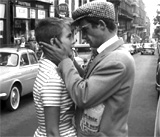
Patricia and Michel Meeting Up on the Street
|

Kissing in the Dark in a Second Movie Theatre
|

Leaving the Movie Theatre
|
- she suggested that they hide in a second
movie theatre to watch Budd Boetticher's western Westbound
(1958) together; they kissed each other in the dark - in giant
close-up - as the film's faux voice-over dialogue noted: "Your
tale is noble and tragic. Like the mask of a tyrant. No drama so
perilous or magnetic. No detail can make our love pathetic" [Note:
The dialogue was a collage of two poems: Louis Aragon's "Elsa Je
T'aime" and Guillaume Apollinaire's "Cors de Chasse (Hunting Horns)"]
- after leaving the theatre, they drove
off in another of Michel's stolen cars when she read in a recently-purchased
newspaper from a drugstore that the cops were after him; he
responded when she asked about how he was reportedly a married man:
"That was ages ago. She was crazy. She dumped me, or I dumped
her. I can't remember"; he was resigned to being followed and
pursued: "Informers inform, burglars burgle, murderers murder, lovers love"; Michel
realized that they must switch cars again to avoid detection, and
he stole a Cadillac Eldorado from a garage; as Patricia drove away
with the car, Michel asked if she was scared and she replied: "It's
too late to be scared"; a rotating newsfeed on the side of a building forecast: "POLICE
CLOSING IN ON MICHEL POICCARD"
- Michel continued his pursuit of petty crook Antonio
to collect on his debt, and found the blackmailer in a restaurant
in Montparnasse - and he finally paid up; they then sought refuge
in an apartment recommended by Antonio, where a professional photo-shoot
was in progress of a swimsuit model; the next morning after staying
the night (Patricia bemoaned the fact that "sleeping together"
actually separated them), she left to purchase a newspaper and
bottle of milk; as she walked by a newspaper stand (with a sign
reading: "Vendredi jour de chance” (Friday Lucky Day)) -
the vendor shouted out for her to buy a lottery ticket:
"It's your lucky day, take a ticket" [Note: it was an ironic foreshadowing
of a very "unlucky day" - the day of her Judas-like betrayal of
Michel and his subsequent death]; she entered a streetside establishment
and ordered a coffee when whiskey wasn't available
- after having covered for Michel when earlier asked
by the authorities about his whereabouts, Patricia realized that
Michel's capture was imminent; she ultimately decided to phone
the Inspector to betray Michel's location to the police: "I've
just seen the man you're looking for"
- shortly after returning, she
told Michel who was still pressuring her to go to Rome, that she
couldn't join him; while pacing in the room, she confessed that
she had reported his location to the police, to betray him and
to remain independent: "I don't want to go with you....I don't
want to be in love with you. That's why I called the police. I stayed
with you to see if I was in love with you. Or if I wasn't in love
with you. And since I'm being cruel to you, it proves I'm not in
love with you...Now you have no choice but to go"; Michel was
upset with her: "They
say there's no happy love... You're out of your mind. That's a
pathetic way to reason. You're like those women who sleep with
everyone, except the one man who loves them, saying it's because
they sleep with everyone";
she encouraged him to leave and admitted: "Why don't you go?
I've slept with lots of boys. Don't count on me. Just go, why wait?";
Michel was convinced that he had to give himself up: ("I'm
in bad shape. Anyway, I want to go to jail. Nobody will talk to
me. I can look at the walls")
- Michel told Antonio when he drove up and handed
him a briefcase full of money: "Cops are coming. The American girl
grassed on me"; Antonio encouraged him to flee, but Michel insisted
on staying: "I've had enough. I'm tired, I want to sleep...Damn the police, I'll
save my neck. I shouldn't be thinking of her but I can't help it"
- in the ending (filmed with a hand-held camera),
as the police pulled up, Michel picked up Antonio's automatic weapon
that was thrown onto the street; gunfire lethally
wounded him as he jogged down a street holding his bloody lower
back (with Patricia pursuing and running after him) [Note: This
death scene directly referenced a similar scene in Anthony Mann's
western Man
of the West (1958).]
- after a long tracking shot, Michel collapsed from
his wounds near the middle of an intersection cross-walk (a symbol
of the Calvary 'cross'?); after he took a last puff on his cigarette
with his last breath, the distressed Patricia and detectives ran
up to his body and surrounded him; she placed one hand over most
of her face and looked down at him; after making grotesque and
grimacing faces (imitating the three 'faces' they had made earlier
in her apartment), he uttered these last icy words to her: (there
are many different translated versions of the French phrase: "C'est
pas vraiment degueulasse"): "Makes
me want to puke" or "You're a real louse (creep, scumbag,
or bitch)" or possibly: "I am a real creep"; he then
covered his own face and closed his eyes with his hand - and then
expired
|
The Shoot-Out Ending: Michel's Death
|

Patricia Pursuing Michel Down the Street
|

Last Dying Breath - A Puff on His Cigarette
|

Surrounded by Detectives and Patricia
|

Patricia Covering Her Face
|

Looking Up at Patricia and Making Three Faces
|

Michel: "You are a real creep" (or "It's really
disgusting")
|

|

|

|
- there were various translations of the final four lines of dialogue between
Michel, Patricia, and Police Inspector Vital
- Patricia asked Vital: "What
did he say?" just before he died; she was told: "He said
you make him want to puke" (or she made him feel nauseated,
disgusted, or sick: "He
said you're a real creep (or bitch)" or "He said you're
a real scumbag" or "He said you're a real louse")
- in the ending, she stared directly at the camera
and responded by imitating Michel, but again asking impassively
what the words meant: "What's that mean, puke?" (or "What's
a 'creep'?" "What's a 'louse'?" or "'A little
what?' I don't understand"); she seemed to have misunderstood
Michel's last words; she ran her thumb across her upper lower
lip (from right to left and around her lower lip) - adopting Michel's
Bogart gesture; she then abruptly turned around - from the camera,
audience, everyone, and the film ended with blackness
|

Opening Dedication to Monogram Pictures

Film's First Image of Pin-Up Girl

Michel's Girlfriend in Marseilles

Driving to Paris in a Stolen Car and Speaking To the Camera

Michel's Shooting Murder of a Motorcycle Policeman on His
Drive to Paris


Michel's US Girlfriend Patricia Franchini (Jean Seberg) Selling
Newspapers

Michel Identified in a Newspaper as a Police Murderer

Michel in Travel Agency Office in Paris
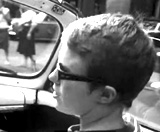
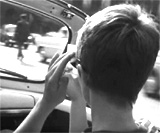

Michel's Car Ride with Patricia to a Dinner Meeting
with a Journalist

Michel's Parting Words to Patricia: "I never want to see
you again. Get lost!


Patricia's Light-Hearted Spirit - Playing Hopscotch and Looking At
Herself in a Storefront Window Reflection

Patricia Surprised to Find Michel In Her Apartment's
Bed

Patricia and Michel Speaking About Love-Making

Patricia: "I want us to be like Romeo and Juliet"

Kissing Sensually


Patricia Asking: "Think she's prettier than me?"

Patricia: "I'm scared, because I want you to love me..."


Hiding Behind Sheets

Patricia Standing Next to Her Own Picture


Last Few Moments in Apartment


Newspaper Headlines: "Police Killer Still At Large"

Interview of Parvulesco (Jean-Pierre Melville) at Orly Airport


In the NY Herald Tribune Office, Patricia Questioned by Inspector Vital
About Michel (Pictured in Newspaper)

Antonio Berruti (Henri-Jacques Huet)

Inspector Vital Firing Upon Michel Who Had Picked up Antonio's Automatic
Weapon Thrown Onto the Street

Michel Jogging Down Street Holding His Wounded Lower Back

Patricia Following After The Wounded Michel As He Ran
Down a Street


Michel Running Into a Major Intersection (Cross-Streets) and Collapsing
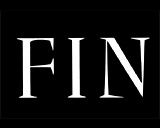
End Title Screen
|








































